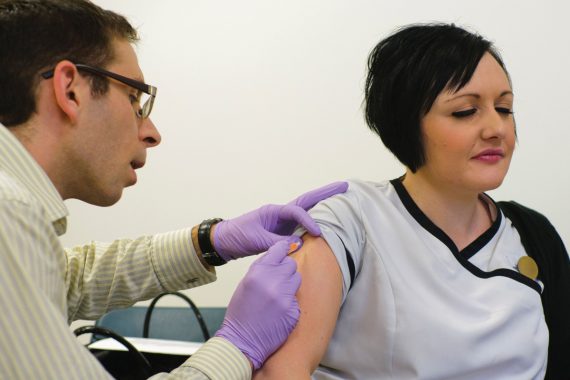Approved Covid vaccines are safe, says ‘reassuring’ MHRA report

The vast majority of side effects reported in the UK for the first 7.4 million doses of Covid vaccines that were administered have been ‘mild and short lasting’, the MHRA has said.
The most commonly reported side effects were a sore arm, fatigue and mild flu-like symptoms, according the first yellow card scheme summary report on Covid vaccines from the the Medicines and Healthcare products Regulatory Agency.
These short-lasting side effects ‘reflects a normal immune response to vaccines’, the MHRA said, adding that the findings were ‘reassuring’.
The safety update report was based on detailed analysis of data up to 24 January 2021, at which point 5.4 million first doses of the Pfizer jab and 1.5 million doses of the Oxford jab had been administered, in addition to half a million second doses, mostly with the Pfizer jab.
At the time:
- 16,756 yellow cards had been reported for the Pfizer/BioNTech vaccine;
- 6,014 had been reported for the Oxford University/AstraZeneca vaccine; and
- 50 had been reported where the brand of the vaccine was not specified.
This means that, for both vaccines, the overall reporting rate was around three yellow cards per 1,000 doses administered, the report added.
The report said: ‘For both vaccines, the overwhelming majority of reports relate to injection-site reactions (sore arm for example) and generalised symptoms such as “flu-like” illness, headache, chills, fatigue (tiredness), nausea (feeling sick), fever, dizziness, weakness, aching muscles, and rapid heartbeat.
‘Generally, these happen shortly after the vaccination and are not associated with more serious or lasting illness.’
In December, GPs were told not to give the Pfizer vaccine to patients with a history of ‘significant’ allergic reaction to a vaccine, medicine or food, following two incidents related to the vaccine.
However this advice was updated by NHS England in early January to say these patients could receive ‘any’ Covid vaccine as long as they are not allergic to any specific vaccine ingredients – although patients should still be monitored for 15 minutes following injection with the Pfizer jab.
Today’s MHRA report said: ‘Widespread use of the vaccine now suggests that severe allergic reactions to the Pfizer/BioNTech vaccine are very rare (less than 1 in 10,000 people receiving this vaccine), and have been reported at a rate between 1 and 2 cases per 100,000 doses administered.’
It added that ‘similar reporting’ was seen in the US with the same vaccine and noted that ‘anaphylaxis can also be a very rare side effect associated with most other vaccines’.
‘Following very substantial exposure across the UK population, no other new safety concerns have been identified from reports received so far,’ the report said.
MHRA chief executive Dr June Raine thanked ‘everyone who has reported potential side effects’ via the yellow card scheme, as ‘every report matters’.
She added: ‘The data we have collected provides further reassurance that the Covid-19 vaccines are safe and continue to meet the rigorous regulatory standards required for all vaccines. We remain confident that the benefits of these vaccines outweigh any risks.
‘Our priority is to ensure the public have safe and effective vaccines and we will continue to analyse, monitor and review all the safety data for these vaccines.’
Over 10 million people had received their first Covid vaccine dose in the UK as of Wednesday this week.
Visit Pulse Reference for details on 140 symptoms, including easily searchable symptoms and categories, offering you a free platform to check symptoms and receive potential diagnoses during consultations.
Related Articles
READERS' COMMENTS [1]
Please note, only GPs are permitted to add comments to articles










Interesting figures
It will help me to use them in counselling these patients with positive history of anaphylaxis in weeks coming .